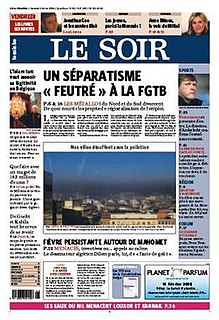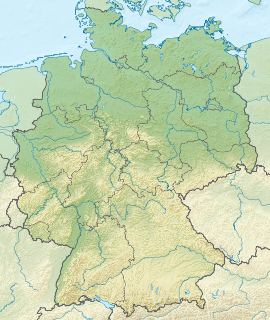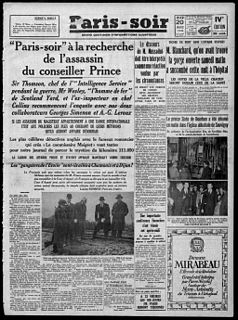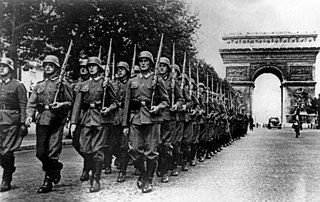
Free France and its Free French Forces was the government-in-exile led by Charles de Gaulle during the Second World War, and its military forces, that continued to fight against the Axis powers as an Allied nation, following the Fall of France. Set up in London in June 1940, it organised and supported the Resistance in Occupied France, and established a foothold within several French colonies in Africa.
Robert Hersant was a French newspaper magnate. He was a leader in the pro-Nazi youth movement during the Vichy wartime years, but after prison time built a major newspaper empire and engaged in conservative politics. At the time of his death he operated 40 publications and employed 8,000 people, but failed in his leap into television.
The National Front was a World War II French Resistance movement created to unite all of the Resistance Organizations together to fight the Nazi occupation forces and Vichy France under Marshall Petain. Founded in 1941 in Paris by Jacques Duclos, Andre Pican and Pierre Villon, along with their wives all members of the French Communist Party (PCF) they felt that to be a vital force against the Nazis, the collaborationists and the informers that all of the Resistance movements, no matter their party or Religion(Jewish or Catholic) had to band together. Its name was inspired by the Popular Front, a left-wing coalition which governed France from 1936 to 1938. This helped them coordinate attacks all across France, to move weapons, food, false identity papers, information and food, protect and move people who were to be arrested or executed and supply multiple safe houses for the Resistance and for Jews. They also formed fighting units in early 1942 to assassinate German leaders and soldiers among the occupation forces, perform acts of sabotage on railroads and other forms of distribution of people and goods being taken from France to Germany and to help organize sabotage in factories forced to produce armaments and goods for the German military.

Le Soir is a French-language Belgian daily newspaper. Founded in 1887 by Emile Rossel, it was intended as a politically-independent source of news. It is one of the most popular Francophone newspapers in Belgium, competing with La Libre Belgique, and since 2005 has appeared in Berliner format. It is owned by Rossel & Cie, which also owns several Belgian news outlets and the French paper La Voix du Nord.
Combat was a large movement in the French Resistance created in the non-occupied zone of France during the Second World War (1939–1945).
France Soir was a French newspaper that prospered in physical format during the 1950s and 1960s, reaching a circulation of 1.5 million in the 1950s. It declined rapidly under various owners and was relaunched as a populist tabloid in 2006. However, the company went bankrupt on 23 July 2012, before re-emerging as an online-only media in 2016. In 2020, according to NewsGuard, this media "fails to adhere to several basic journalistic standards".

The Military Administration in France was an interim occupation authority established by Nazi Germany during World War II to administer the occupied zone in areas of northern and western France. This so-called zone occupée was renamed zone nord in November 1942, when the previously unoccupied zone in the south known as zone libre was also occupied and renamed zone sud.
La Voix du Nord is a regional daily newspaper from the north of France. Its headquarters are in Lille.

L'Illustration was a weekly French newspaper published in Paris from 1843 to 1944. It was founded by Édouard Charton with the first issue published on 4 March 1843, it became the first illustrated magazine in France then, after 1906, the first in the world, distributed in 150 countries.
The Tour de France was not held during World War II because the organisers refused German requests. Although a 1940 Tour de France had been announced earlier, the outbreak of the war made it impossible for it to be held. After that, some attempts were made by the Germans during the war to have a Tour de France to maintain the sense of normality, but l'Auto, the organising newspaper, refused. Some other races were run as a replacement.

Jean Cassou was a French writer, art critic, poet, member of the French Resistance during World War II and the first Director of the Musée national d'Art moderne in Paris.

Vichy France is the common name of the French State headed by Marshal Philippe Pétain during World War II. It was an independent ally of Nazi Germany until late 1942 when Berlin took full control. Evacuated from Paris to the resort town of Vichy in the unoccupied "Free Zone" in the southern part of Metropolitan France, it remained responsible for the civil administration of France as well as its colonies.
"Résistancialisme" is a neologism coined by historian Henry Rousso to describe exaggerated historical memory of the French Resistance during World War II. In particular, résistancialisme refers to exaggerated beliefs about the size and importance of the resistance and anti-German sentiment in German-occupied France in post-war French thinking.

The Sigmaringen enclave was the exiled remnant of France's Nazi-sympathizing Vichy government which had to flee to Germany during the Liberation of France near the end of World War II in order to avoid capture by the advancing Allied Powers of World War II. They were allocated the requisitioned Sigmaringen Castle as the seat of their government-in-exile.

Various kinds of clandestine media emerged under German occupation during World War II. By 1942, Nazi Germany occupied much of continental Europe. The widespread German occupation saw the fall of public media systems in France, Belgium, Poland, Norway, Czechoslovakia, Northern Greece, and the Netherlands. All press systems were put under the ultimate control of Joseph Goebbels, the German Minister of Propaganda.

Jean Prouvost was a businessman, media owner and French politician. Prouvost was best known for building and owning the publications that became France-Soir, Paris Match, and Télé 7 Jours.

Paris started mobilizing for war in September 1939, when Nazi Germany attacked Poland, but the war seemed far away until May 10, 1940, when the Germans attacked France and quickly defeated the French army. The French government departed Paris on June 10, and the Germans occupied the city on June 14. During the Occupation, the French Government moved to Vichy, and Paris was governed by the German military and by French officials approved by the Germans. For Parisians, the Occupation was a series of frustrations, shortages and humiliations. A curfew was in effect from nine in the evening until five in the morning; at night, the city went dark. Rationing of food, tobacco, coal and clothing was imposed from September 1940. Every year the supplies grew more scarce and the prices higher. A million Parisians left the city for the provinces, where there was more food and fewer Germans. The French press and radio contained only German propaganda.
Évelyne Baylet was a French company director. She served between 1959 and 1995 as president of the La Dépêche du Midi newspaper group, while pursuing a parallel career as a regional politician.

The clandestine newspapers of the Resistance were newspapers created in France during Second World War by the movements of Resistance to the German occupation of France, to disseminate their ideas, which played an important role in the history of French journalism, particularly during the 1944 Freedom of the Press Ordinances.











